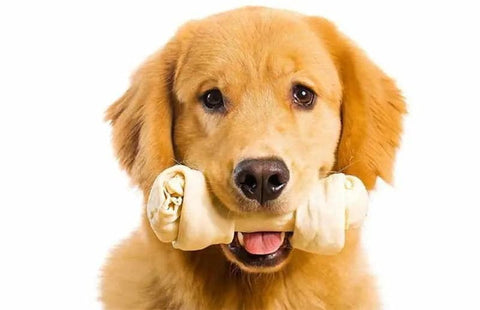
Why do dogs like bones?
First of all, The relationship between the dog and the bones could date back to the canines’ ancestors' hunt for survival. In addition, bones represent good taste and nutrition to dogs. Bone marrow is rich in fat and high in calcium. The meat left on the bones has a lot of protein. Moreover, Chewing bones is also a good time for dogs. It satisfies their natural desire to chew. Chewing also stimulates the release of endorphins, hormones that are important for happiness in dogs.
However, there should be a discussion about how to choose the bones for the dog and safety. After all, you don't want the dog to get hurt.
What kind of bones are safe for dogs?
Firstly, raw marrow bones such as long femurs and thick shin bones are the best choice for the dog. And you should make sure that the bones can not be swallowed whole. In addition, the other good choice is artificial bones that are specially made for dogs to chew, including rawhide, nylon, and starch-based bones available at pet stores. Moreover, For dogs with bad teeth who want bone for calcium, it is best to pulverize the bone into dog food-size pellets or add it to dog food as a powder.


What kind of bones are bad for dogs?
Any cooked bones are hard enough to break teeth easily, neither the small bones such as chicken bones nor the fish or duck bond. In more serious cases, a dog's stomach can be punctured, leading to gastrointestinal bleeding.
What is the benefits to chew bones ?
Teeth cleaning
Bones and other natural chews can serve as an effective and fun way to help teeth sparkle!
Calcium supplement
The dog through chewing bone can offer them key nutrients such as calcium and phosphorous, both of which help aid muscle and bone development.
Less unwanted chewing habits
Chewing bones distract dogs from your household items and help them with good chewing habits. As recreation Dogs with long-lasting chews such as bones can release boredom. And the process of chewing on bones gives dogs as much happiness as the delicious flavor these chews contain!
What are the potential dangers of chewing bones?
Improper bone feeding can affect the health of dogs, such as esophageal obstruction caused by large bones, gastritis and gastroenteritis caused by chewing too many bones, bone spur injury to the mouth, digestive tract, gastric perforation caused by sharp bone fragments, etc.
How to avoid the dangers to chew bones?
You should keep an eye on your dog while they enjoy a bone as they could run the risk of breaking the bones up into smaller bits that could get then get swallowed. And never allow them to chew small bones, which can break and splinter and cause injury.

![[TrainerPro] Dog Training Collar with Remote for 2 Dogs](http://www.funnipets.com/cdn/shop/products/page-8_8ae9e4fa-7fb3-4f08-8af8-0c0214684d22_{width}x.jpg?v=1642751785)
![[FunTrainer] Shock Collar for Dogs with Remote up to 875 yards](http://www.funnipets.com/cdn/shop/products/page-4_{width}x.jpg?v=1642751700)
![[FunTrainer] Dog Shock Collar with Remote for 2 Dogs](http://www.funnipets.com/cdn/shop/products/page-5_1d69dcda-629e-4968-ad58-8258216f09d1_{width}x.jpg?v=1642751657)
![[TrainerPro+] Dog Training Collar with Remote for 2 Dogs](http://www.funnipets.com/cdn/shop/products/page-7_a9f4b191-de9a-4934-b5ee-9a2c595d57f1_{width}x.jpg?v=1642751745)